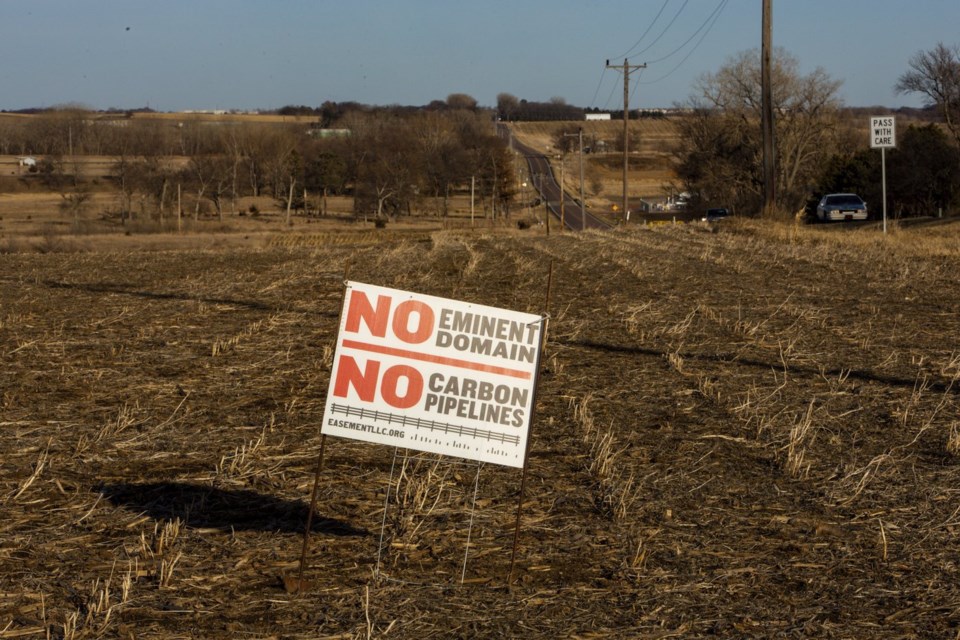MANSFIELD, S.D. (AP) — The company behind a proposed pipeline that would transport carbon dioxide emissions from ethanol plants across five Midwest states and store it underground in North Dakota in recent years, an analysis by Lee Enterprises and The Associated Press found.
This litigation was concentrated in South Dakota, where the company, Summit Carbon Solutions, filed eminent domain lawsuits against landowners across the state. Eminent domain is the taking of private property with compensation to the owner. The legal salvo generated so much outrage among farmers that South Dakota’s governor in early March that bans the use of eminent domain for building carbon dioxide pipelines, putting the future of the project in question.
The AP and Lee Enterprises reviewed hundreds of court cases across multiple states and interviewed landowners, attorneys, academic experts and local elected officials.
Here are key takeaways from the report:
Summit sprayed landowners with lawsuits
The analysis found Summit brought 232 lawsuits against landowners across South Dakota, North Dakota and Iowa – including lawsuits seeking access to property for surveys. All 156 of the eminent domain actions were brought in South Dakota. Over the course of two days in late April 2023, the company filed 83 eminent domain lawsuits across the state.
In a statement, Summit spokesperson Sabrina Zenor said the company’s priority is voluntary agreements and that the “vast majority of easements have been and continue to be" secured voluntarily.
Summit kept filing eminent domain lawsuits in South Dakota until late August 2023. In seven South Dakota cases, landowners signed easements after getting sued by Summit, court records show. But after the South Dakota Public Utilities Commission in September 2023, Summit “paused or dismissed” the legal actions, Zenor said.
Project backed by the ethanol industry
Summit’s supporters view its proposed pipeline as a potential economic boon.
Nearly 40% of the nation’s corn crop is brewed into ethanol, which is blended into most gasoline sold in the U.S. With the rise of electric vehicles and less of the fuel additive powering cars, some Midwest farmers and the ethanol industry see passenger jet fuel as a But under current rules, the process for turning ethanol into aviation fuel would need to emit less carbon dioxide to qualify for tax breaks intended to reduce greenhouse gases. Supporters see carbon capture projects such as Summit’s pipeline as a way to fight climate change and to help the ethanol industry.
Carbon capture involves separating carbon dioxide from the emissions of industrial facilities, such as ethanol plants, and pumping it underground where it is stored so it doesn’t contribute to climate change.
Outrage in South Dakota led to legislative action
Summit’s litigation against South Dakota landowners and controversy surrounding their land surveys fueled local backlash to the project. One farmer in particular, Jared Bossly, and his run-ins with Summit, galvanized the project’s opponents.
Bossly battled Summit in court for months to keep the company from surveying his farm in Brown County, a rural farming stretch of northeastern South Dakota. The company filed eminent domain lawsuits against Bossly and accused him of threatening to kill their surveyors when they visited his property. Bossly denies that he made the threat. Summit eventually surveyed his property on June 20, 2023, and photos and video of the incident circulated online. He became a central figure in the opposition to the pipeline, doing frequent media interviews and speaking at public meetings.
In 2024, Summit’s opponents in South Dakota notched wins. In the primary election, a number of state lawmakers were ousted by candidates who opposed the pipeline and Summit’s use of eminent domain, according to Jim Mehlhaff, the Republican majority leader in the South Dakota Senate and a supporter of the pipeline. The new composition of the state legislature, along with political pressure from Summit’s vocal opponents, were the main reasons why the new eminent domain law was approved, Mehlhaff said.
It’s unclear how Summit will proceed with its project in South Dakota. Summit spokesperson Zenor said the company is focused on advancing the project in states that “support investment and innovation” but added that Summit continues to “believe there is a path forward” in South Dakota.
___
This story is a collaboration between Lee Enterprises and The Associated Press.
By Eric Ferkenhoff/lee Enterprises And Josh Kelety/ap, The Associated Press




